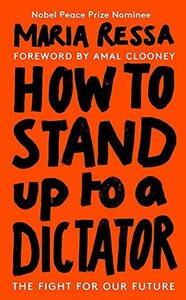Take a photo of a barcode or cover
informative
reflective
medium-paced
challenging
hopeful
informative
inspiring
tense
fast-paced
A blend of memoir and manifesto. It was really interesting to read about her path to journalism, and her fight for ethical journalism in the face of authoritarian governments and the spread of disinformation through social media.
emotional
hopeful
informative
inspiring
tense
fast-paced
Moderate: Cancer, Death
challenging
informative
sad
dark
informative
inspiring
sad
medium-paced
challenging
dark
hopeful
informative
reflective
medium-paced
The topic could not be more timely -- combatting disinformation and rising fascism. While the situation was particularly acute for Ressa under Dutuerte in the Philippines, the issue affects us all. I wish Ressa were a more elegant writer and had told her story in a more compelling fashion, but I'm glad for having read it and for her advice on how to battle "surveillance capitalism" and the pernicious use of social media to distort reality and polarize the citizenry.
challenging
dark
hopeful
informative
inspiring
reflective
medium-paced
I first heard of Maria Ressa one night watching Stephen Colbert's show. On the show she discussed her book, How to Stand Up to a Dictator: The Fight for Our Future. I was so very impressed listening to her talk that I felt I should get the book. So, of course, I did. I'm glad that I did, even though the subject matter is very depressing.
The story is a biography but it is focused on the past few years when Maria was working as a reporter and more in the Phillipines. She worked for the biggest broadcaster in the Phillipines, ABS - CBN. She worked for CNN as a Far East as a reporter and bureau chief. With broadcasting friends, she established Rappeler, an innovative online news organization which was one of the most successful on the Facebook platform.
However, this story is mainly a cautionary tale. Maria has spent the latter years fighting the corruption of the Duterte regime in the Phillipines and has had to deal with online harassment from Duterte's hate platforms, as well as fight against corruption charges from a corrupt regime. All the while, she has continued to work for freedom of the press, for an honest press. She received a Nobel Peace Prize for her efforts.
It's a fascinating story and a warning. Despots and fascists and right wing fanatics have taken over the internet, use Facebook to spew vitriol and to ruin peoples' lives. The Duterte regime was expert at this and this skill has been passed to other right wing regimes; Hungary, Myanmar, even the US.
Maria Ressa tries to explain how to fight back. She has 3 pillars to fight with -
- Technology. Demand accountability from technology starting with government action. One thing that Rappeler rolled out was Lighthouse, a technology platform built by journalists to try to preserve public discourse around facts.
- Protect and grow investigative journalism. There is a global initiative International Fund for Public Interest Media, a short - medium term solution to the drop in advertising revenues of news groups all around the world.
- Build larger and larger communities of action. Collaborate to protect frontline journalists.
It's a constant fight to preserve democracy and a free press is part of that. The story is well - written, interesting, tense and provides a great picture of Maria and her friends / partners and their efforts to keep reporting under horrendous pressure. It should be read because one thing Donald Trump and allies want is an uneducated public and part of the way to achieve that is to seed and foment distrust against a free press. Anyway, check it out. (4.5 stars)
The story is a biography but it is focused on the past few years when Maria was working as a reporter and more in the Phillipines. She worked for the biggest broadcaster in the Phillipines, ABS - CBN. She worked for CNN as a Far East as a reporter and bureau chief. With broadcasting friends, she established Rappeler, an innovative online news organization which was one of the most successful on the Facebook platform.
However, this story is mainly a cautionary tale. Maria has spent the latter years fighting the corruption of the Duterte regime in the Phillipines and has had to deal with online harassment from Duterte's hate platforms, as well as fight against corruption charges from a corrupt regime. All the while, she has continued to work for freedom of the press, for an honest press. She received a Nobel Peace Prize for her efforts.
It's a fascinating story and a warning. Despots and fascists and right wing fanatics have taken over the internet, use Facebook to spew vitriol and to ruin peoples' lives. The Duterte regime was expert at this and this skill has been passed to other right wing regimes; Hungary, Myanmar, even the US.
Maria Ressa tries to explain how to fight back. She has 3 pillars to fight with -
- Technology. Demand accountability from technology starting with government action. One thing that Rappeler rolled out was Lighthouse, a technology platform built by journalists to try to preserve public discourse around facts.
- Protect and grow investigative journalism. There is a global initiative International Fund for Public Interest Media, a short - medium term solution to the drop in advertising revenues of news groups all around the world.
- Build larger and larger communities of action. Collaborate to protect frontline journalists.
It's a constant fight to preserve democracy and a free press is part of that. The story is well - written, interesting, tense and provides a great picture of Maria and her friends / partners and their efforts to keep reporting under horrendous pressure. It should be read because one thing Donald Trump and allies want is an uneducated public and part of the way to achieve that is to seed and foment distrust against a free press. Anyway, check it out. (4.5 stars)
hopeful
informative
inspiring
medium-paced




